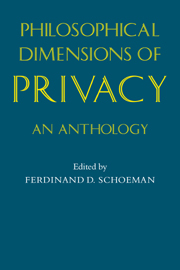Book contents
- Frontmatter
- Contents
- List of contributors
- Preface
- 1 Privacy: philosophical dimensions of the literature
- 2 Social distance and the veil
- 3 The origins of modern claims to privacy
- 4 The right to privacy [the implicit made explicit]
- 5 Privacy [a legal analysis]
- 6 Privacy as an aspect of human dignity: an answer to Dean Prosser
- 7 Privacy [a moral analysis]
- 8 Privacy, freedom, and respect for persons
- 9 Privacy and self-incrimination
- 10 Intimacy and privacy
- 11 The right to privacy
- 12 Why privacy is important
- 13 Privacy, intimacy, and personhood
- 14 Privacy: some arguments and assumptions
- 15 An economic theory of privacy
- 16 Privacy and the limits of law
- 17 Privacy and intimate information
- Selected bibliography
- Index of names
1 - Privacy: philosophical dimensions of the literature
Published online by Cambridge University Press: 12 December 2009
- Frontmatter
- Contents
- List of contributors
- Preface
- 1 Privacy: philosophical dimensions of the literature
- 2 Social distance and the veil
- 3 The origins of modern claims to privacy
- 4 The right to privacy [the implicit made explicit]
- 5 Privacy [a legal analysis]
- 6 Privacy as an aspect of human dignity: an answer to Dean Prosser
- 7 Privacy [a moral analysis]
- 8 Privacy, freedom, and respect for persons
- 9 Privacy and self-incrimination
- 10 Intimacy and privacy
- 11 The right to privacy
- 12 Why privacy is important
- 13 Privacy, intimacy, and personhood
- 14 Privacy: some arguments and assumptions
- 15 An economic theory of privacy
- 16 Privacy and the limits of law
- 17 Privacy and intimate information
- Selected bibliography
- Index of names
Summary
Privacy as a topic is as fascinating as it is important. Though we all acknowledge its value in the abstract, there are numerous grounds for puzzling over its significance, and for being suspicious of its value. The right to privacy is seen as creating the context in which both deceit and hypocrisy may flourish: It provides the cover under which most human wrongdoing takes place, and then it protects the guilty from taking responsibility for their transgressions once committed. The right to privacy often stands in the way of vigorous public debate on issues of moral significance. Without the shade of privacy, many practices that are arguably legitimate though in fact illegal might be thoroughly and rationally debated rather than left unexposed and unexamined. Concern for one's own privacy may be regarded as a sign of moral cowardice, an excuse not to state clearly one's position and accept whatever unpopularity might ensue. Privacy may be seen as a culturally conditioned sensitivity that makes people more vulnerable than they would otherwise be to selective disclosures and to the sense of comparative inferiority and abject shame – a sense engendered by ignorance about the inner lives of others.
The literature and popular lore about privacy is full of surprising claims. Despite the fact that privacy has been identified by contemporary philosophers as a key aspect of human dignity, or alternatively as something even more basic than rights to property or than rights over one's own person, there was no major philosophical discussion of the value of privacy until the late 1960s.
- Type
- Chapter
- Information
- Philosophical Dimensions of PrivacyAn Anthology, pp. 1 - 33Publisher: Cambridge University PressPrint publication year: 1984
- 21
- Cited by

